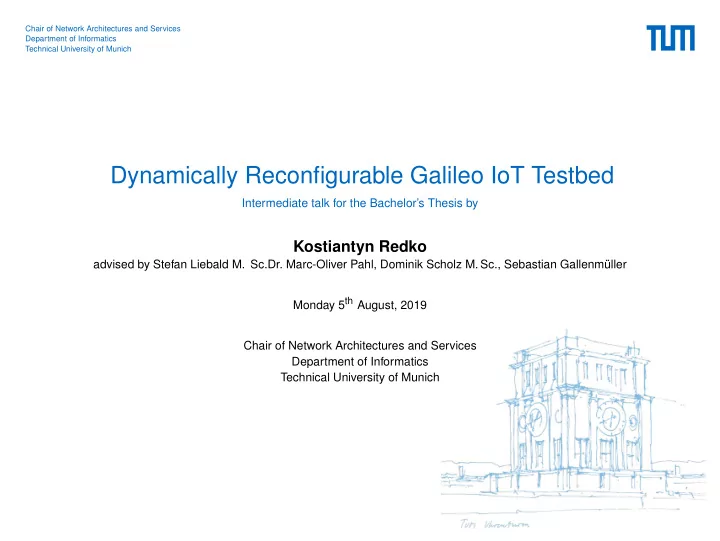

Chair of Network Architectures and Services Department of Informatics Technical University of Munich Dynamically Reconfigurable Galileo IoT Testbed Intermediate talk for the Bachelor’s Thesis by Kostiantyn Redko advised by Stefan Liebald M. Sc.Dr. Marc-Oliver Pahl, Dominik Scholz M. Sc., Sebastian Gallenmüller Monday 5 th August, 2019 Chair of Network Architectures and Services Department of Informatics Technical University of Munich
Motivation and Goals Motivation • Improvement of IoT software testing • Intel Galileo not studied enough Research Questions • How can OS images be deployed to a board’s SD card in an automated and reliable way? • What infrastructure is needed to manage a testbed of connected IoT nodes? • How can testbed failures be detected? • How can the system revert itself into the initial state if some of the components have failed or are unresponsive? Redko — Galileo Testbed 2
Requirements Analysis Usage of Intel Galileos as a primary node type in our testbed imposes some restrictions on how the testbed can be implemented. These include: • The testbed can not rely on network boot of the nodes • CPU bug restricts software that the node can run As a result, the following requirements arise for the testbed: • Intel Galileo (Gen. 2) Support • OS agnosticism • No PXE reliance • Robustness • High Degree of Automation • Open-source • Traffic Shaping Redko — Galileo Testbed 3
Related Work Emulab [7] Fit IoT-LAB [5] pos [6] × × × Intel Galileo (Gen. 2) Support × � OS agnosticism ◦ × � � No PXE reliance � � � Robustness � � � High Degree of Automation × � � Open-source × × × Traffic Shaping Redko — Galileo Testbed 4
Related Work Various utility projects like: • Busybox [1] • OS image related: • Linux kernel 3.18 for Intel Galileo [4] • Debian for Intel Galileo [2] • Gentoo for Intel Galileo [3] Redko — Galileo Testbed 5
Design pos will be used as a base for the testbed. Although it does not satisfy all our requirements, it can be easily extended. Proposed solution: • Intel Galileo (Gen. 2) Support Extend pos to support Intel Galileo. • OS agnosticism Provided by pos . The OS needs to satisfy some requirements, e.g. SSH server and Python. Other than that we are free to use anything we want. • No PXE reliance pos provides a set of interfaces that can be imlemented to suit our chosen boot method. • Robustness Monitoring and automated reboots when necessary. • High Degree of Automation Setup process with Ansible. pos integration will provide automation for a most of the processes. • Upgradability Setup process with Ansible. • Open-source Yes. • Traffic Shaping Currently being researched. Redko — Galileo Testbed 6
Design Figure 1: Xmess Redko — Galileo Testbed 7
Design Figure 2: Sequence Diagram Redko — Galileo Testbed 8
Current State Finished: • Basic pos integration • Baseline OS image creation • Setup process with Ansible Plans: • Bugfixes and gradual improvements • Traffic shaping • Evaluation Redko — Galileo Testbed 9
Bibliography [1] Busybox, may 2019. [2] Debian wheezy image for intel galileo, august 2019. [3] Gentoo image for intel galileo, august 2019. [4] Linux kernel 3.19.8 for intel galileo, august 2019. [5] C. Adjih, E. Baccelli, E. Fleury, G. Harter, N. Mitton, T. Noel, R. Pissard-Gibollet, F. Saint-Marcel, G. Schreiner, J. Vandaele, et al. Fit iot-lab: A large scale open experimental iot testbed. In 2015 IEEE 2nd World Forum on Internet of Things (WF-IoT) , pages 459–464. IEEE, 2015. [6] S. Gallenmüller, D. Scholz, F. Wohlfart, Q. Scheitle, P . Emmerich, and G. Carle. High-Performance Packet Processing and Measurements (Invited Paper). In 10th International Conference on Communication Systems & Networks (COMSNETS 2018) , Bangalore, India, Jan. 2018. [7] M. H. R. R. L. Stoller, J. Duerig, S. Guruprasad, T. Stack, K. Webb, and J. Lepreau. Large-scale virtualization in the emulab network testbed. In USENIX Annual Technical Conference, Boston, MA , 2008. Redko — Galileo Testbed 10
Recommend
More recommend